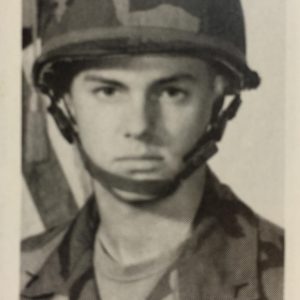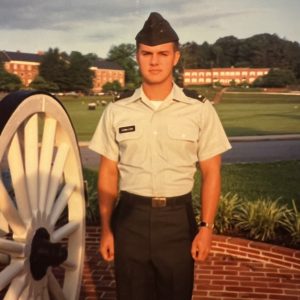Happy Veterans Day, and thank you to everyone who’s put on a uniform to serve our great country. Unlike Memorial Day, which is a day of remembrance for those who died in service, Veterans Day is a chance to celebrate and give thanks to those who’ve served in our nation’s Armed Forces. Today, we honor everyone who served, regardless of their job, rank, or branch—they answered the call, and every role was essential to the overall mission. I’m grateful to all the veterans out there and thankful for my own opportunity to serve. In the spring of 1985 I enlisted in the U.S. Army and attended Infantry basic training at Ft. Benning (now Ft. Moore) during that summer.
The Realities of Boot Camp
Boot camp was my first real taste of Army life. When I arrived on base, things got serious really quick as the military barber shaved off my 80’s mullet and left me with a bald head. Those summer days in the south Georgia heat were long, tough, and intensely focused. Training pushed us physically and mentally to our limits. In the Army, there’s no mistaking the purpose behind every moment. Everything we did was all about mission, discipline, and learning to rely on each other. From pre-dawn workouts to the long drills, every bit of it demanded we look past ourselves and see our place in the bigger mission. It may seem weird, but I miss those days of being on a team serving a bigger purpose – maybe now more than ever.
Civilian life, of course, is very different. In the business world, people tend to focus on their own goals and individual success. Boot camp was a wake-up call in that regard—it taught me the power of teamwork, structure, and responsibility to a cause beyond my own. Those lessons stayed with me throughout my military career and have shaped my approach in business to this day. Honestly, I think that’s one of the biggest shocks a soldier faces when they take off the uniform—it’s no longer about the mission but more about each person looking out for themselves. In the military, we took care of each other. In civilian life, people are often more self-focused, looking out for themselves, often to the detriment of others or to gain an edge over someone else.
College, ROTC, and Becoming an Officer
After basic training, I was a member of the Boar’s Head Brigade, the University of North Georgia’s award-winning ROTC program in college. ROTC balances the regular academic experience with the rigors of military training. ROTC had a different flavor than boot camp—more leadership-oriented but just as demanding. Each training camp, from field exercises to leadership drills, added another layer to my understanding of what it meant to serve and lead. Airborne school was one of the highlights, teaching me how to take leaps—literally out of a plane—and trust the process, no matter how scary it seemed.
All of this led up to my commission in June 1989, where I took the Army officer’s oath:
“I do solemnly swear that I will support and defend the Constitution of the United States against all enemies, foreign and domestic; that I will bear true faith and allegiance to the same; that I take this obligation freely, without any mental reservation or purpose of evasion; and that I will well and faithfully discharge the duties of the office upon which I am about to enter; So help me God.”
Taking the Army officer’s oath was a serious commitment. Unlike a civilian job contract, an Army commission doesn’t simply “expire.” When officers are commissioned, it’s considered a lifetime appointment, meaning they retain their rank and status even after they leave active duty. This was an oath not to serve any single person, but to protect and defend the Constitution against all enemies, foreign and domestic. The focus of this oath isn’t a President, a commanding officer, or even the military itself—it was the Constitution, representing the rights, freedoms, and responsibilities of the entire nation.
In most civilian jobs, there’s no equivalent to this kind of oath. People agree to a set of tasks in exchange for salary and benefits—an arrangement based on economic gain. But this oath was different. It meant devoting myself fully, not for personal benefit, but to uphold a commitment to the country and its values. In civilian life, success is often measured by status, fame, and money. I still don’t understand why our country rewards greed or why many of my peers in business are always trying to “one up” each other. As a soldier, you work as part of a team, with a shared mission to overcome a known adversary. This sense of duty left a lasting mark on me and continues to guide how I serve my community today. Looking back on my 30 years as a civilian, I might have made more money by putting myself first, but that same sense of military duty drives me to put others first and money second.
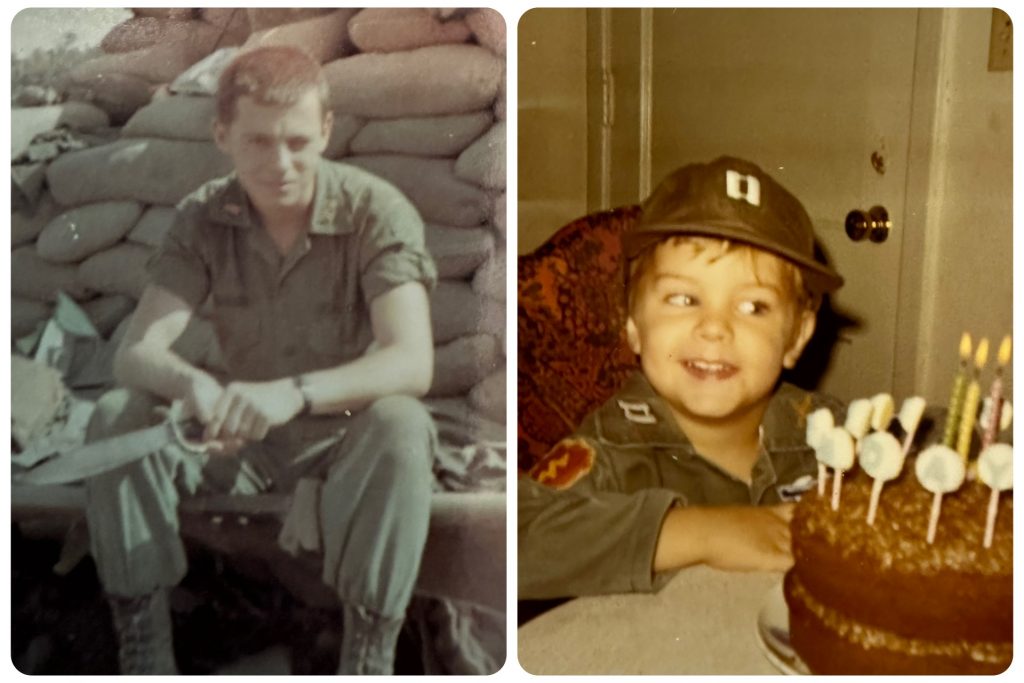
My father served as an Infantry officer in Vietnam. He’s been my hero and I’ve always wanted to follow in his footsteps, even when I was little. Photo/Jean Domaleski
Living by Army Values and the Warrior Ethos
The Army Values are: Loyalty, Duty, Respect, Selfless Service, Honor, Integrity, and Personal Courage. They form the foundation of how a service member lives and serves. Loyalty is about unwavering commitment to the Constitution, the Army, and fellow soldiers. Duty means always fulfilling our obligations, and Selfless Service requires putting others before ourselves. Honor and Integrity demand that we uphold what is right, while Personal Courage pushes us to confront fear and adversity head-on. These values guide soldiers in every decision, but in civilian life, they’re not always as visible. In fact, oftentimes the opposite is seen and encouraged. Many people are quick to put themselves first, or to compromise on integrity for personal gain. I know that I’ve fallen short of the Army Values, but I do aspire to uphold them even outside the Army.
The Warrior Ethos goes further, promoting a mindset that soldiers carry with them in all aspects of life. It teaches us to:
• Place the mission first
• Never accept defeat
• Never quit
• Never leave a fallen comrade
In the civilian world, people often prioritize personal goals over a shared mission, focusing on individual success rather than team outcomes. “What’s in it for me?” seems to be how people these days evaluate life choices. Many quit when things get tough, and the drive to persevere can feel rare. The Ethos’ commitment to “never quit” has been a source of strength for me, especially as a business owner. There were times when economic challenges made it tempting to pack it up, and some even encouraged me to do so. But that Ethos—to see the mission through, to keep pushing despite setbacks—has kept me going. This dedication to the mission, even in the face of hardship, has proven to be one of the greatest lessons I carried with me from my time in the Army.
Transitioning to Civilian Life
After eight years in uniform, the transition to civilian life was both a relief and a challenge. Civilian work has its own goals, often driven by the bottom line. In business, we focus on profit, market share, and growth, with less emphasis on a greater purpose. It’s easy to lose sight of the bigger picture when individual success becomes the priority. The military, while not without its flaws, operates on a very different foundation. We’re taught to put the mission and the team first, with a clear sense of service beyond ourselves.
That difference makes the shift to civilian life challenging for many veterans. In the military, we reward heroes who defend freedom, often risking their own safety. In the civilian world, however, success is frequently tied to fame or wealth—whether that’s making TikTok videos, playing sports, or closing business deals. I know our community is now a “movie town,” but isn’t it ironic that actors portraying heroes often gain more recognition and money than the real heroes they’re based on? For these reasons and more, many civilians who haven’t served struggle to fully understand what drives and motivates veterans; our values and outlook come from a place they haven’t experienced.
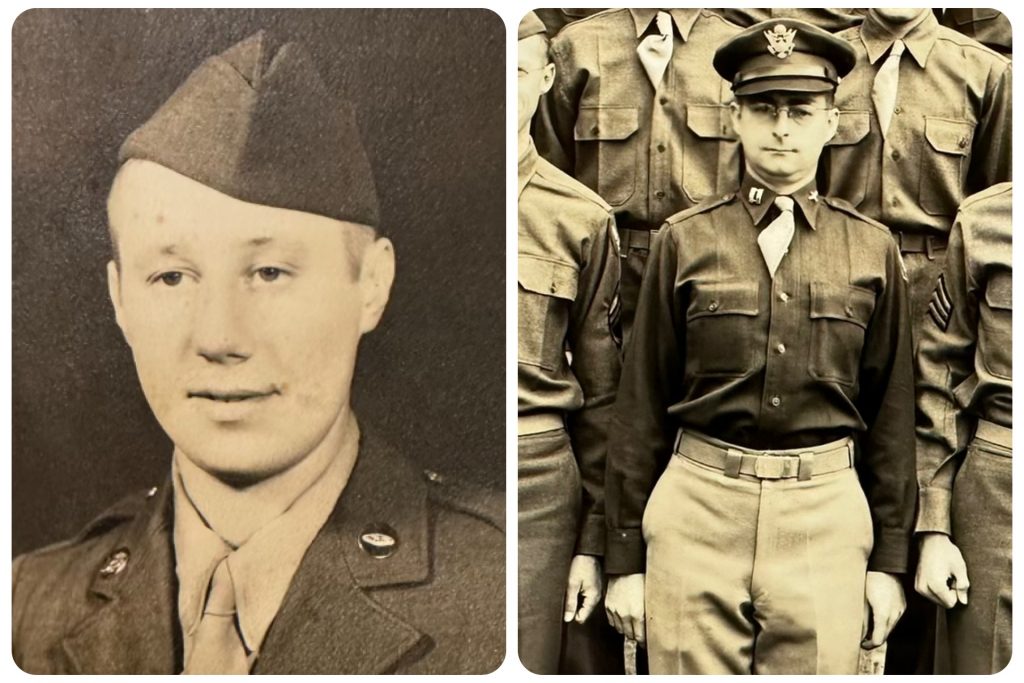
I’m a third generation soldier. My grandfathers served in the US Army during World War II – (left) Edward Domaleski, Sr. & (right) CPT E.L. Stephenson. Photo/Jean Domaleski archive
Even though I no longer wear a uniform, the Army values have stayed with me. As a business owner, I’ve tried to lead with the same commitment to service and integrity that the military instilled in me. In the Army, selfless service means putting the team and mission ahead of personal gain, and I’ve carried that approach into my work by focusing on ways to support my community beyond immediate profit. Whether it’s sponsoring local events or simply being transparent and fair with customers, putting others’ needs first is my way of honoring that value of selfless service.
In civilian life, there’s often a focus on ease and avoiding discomfort. But in the military, discomfort is a given—something we learn to push through and embrace. That mindset has been invaluable as I’ve faced hardships in business. Integrity and honor were non-negotiable in the Army, and while I’m far from perfect and often fall short of those standards, I try to live by them. Sometimes that means making less money or having less social influence than others in my position, but for me, doing what’s right and building trust are worth more than short-term gains. These values keep my business grounded in the same principles that guided me in uniform.
A Challenge for Business and Civic Leaders
This Veterans Day, as we honor the men and women who served, I want to challenge business and community leaders to bring that same spirit of service into their work. Yes, money matters—but it shouldn’t be the only thing that matters. Each of us has a part to play in making our communities stronger, and that starts by leading with integrity, responsibility, and a focus on something greater than ourselves.
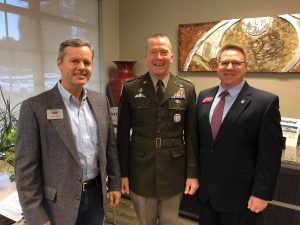
Serving the community at the Fayette County Chamber of Commerce. Here I am with MG Thomas Carden, former Georgia Adjutant General, and Representative Josh Bonner, who’s also a Colonel in the Army Reserves. Photo/COL (Ret) Will Garner.
If we truly want to honor our veterans, let’s do it by living out the values they stood for. Lead with loyalty to your community, serve selflessly, and have the courage to put others first. And take a moment to thank a veteran—face to face, not just with a social media post. Building a better business and a stronger community doesn’t just pay tribute to those who’ve served—it leaves a legacy that carries forward the true meaning of Veterans Day.
To my fellow veterans, thank you. I’m deeply grateful to have had the chance to serve our country—it has made me a better person and continues to inspire me to keep going when things get tough. Our service and sacrifice will always be a part of who we are.
[Joe Domaleski, a Fayette County resident for 25+ years, is the owner of Country Fried Creative – an award-winning digital marketing agency located in Peachtree City. His company was the Fayette Chamber’s 2021 Small Business of the Year. Joe is a husband, father of three grown children, and proud Army veteran. He has an MBA from Georgia State University and enjoys sharing his perspectives drawing from thirty years of business leadership experience. Joe is a recipient of the Peachtree City Rotary Club Business Leader of the Year Award for 2024. Sign up for the Country Fried Creative newsletter to get marketing and business articles directly in your inbox. You can connect with Joe directly on LinkedIn or follow his new blog Marketing Data Science for more insights and updates.]

